The Shock Doctrine: The Rise of Disaster Capitalism
by Naomi Klein
About The Author
Naomi Klein is an award-winning journalist, syndicated columnist, documentary filmmaker and author of the international bestsellers No Logo: Taking Aim at the Brand Bullies, The Shock Doctrine: The Rise of Disaster Capitalism and This Changes Everything: Capitalism vs. the Climate. She is a senior correspondent for The Intercept and her writing appears widely in such publications as The New York Times, Le Monde, The Guardian and The Nation, where she is a contributing editor. Klein is a member of the board of directors for climate-action group 350.org and one of the organizers behind Canada’s Leap Manifesto. In November 2016 she was awarded Australia’s prestigious Sydney Peace Prize for, according to the prize jury, “inspiring us to stand up locally, nationally and internationally to demand a new agenda for sharing the planet that respects human rights and equality.” Her books have been translated into more than thirty languages.
Praise for “The Shock Doctrine”:
“Brilliant and horrifying”
Patrick McGrath,Sunday Herald, Books of the Year
“The Shock Doctrine aims it’s 10-foot-long middle finger at the bush administration and generations of neocons who’ve chosen profits over people in war and disaster”
The Village Voice
You must read what may be the most important book on economics in the twenty-first century”
Dow Jones Business News
“Her compelling study of the dark heart of capitalism”
New York Observer
“If you know people who belive that free markets and democracy walk hand in hand, give them this for Christmas. This is past, present and future all in one”
Peter Carey, Guardian, Books of the Year
“Essential and compelling”
Irish Times
“Anticipates the widespread disquiet – nay, rage – at the state of the world as successfully as her previous bestseller, No Logo…Anyone who wishes to know what our children will believe should read The Shock Doctrine”
Nicholas Blincoe, Daily Telegraph
“It will echo around the world”
Independent
“Naomi Klein is one of the most important new voices in American journalism today, as this book makes clear. She has turned globalism inside out”
Seymour M. Hersh
“Uncompromising, a fierce riposte to the doctrine of economic shock therapy”
Sunday Telegraph
“She takes the central myth of the right – that. Since the fall of Soviet tyranny, free elections and free markets have skipped hand in hand together towards the shimmering sunset of history – and shows that it is, simply, a lie…written with a perfectly anger, channelled through hard fact. She has indeed surpassed No Logo. Today, this brilliant book should stir a tsunami of shame – and of political action”
Johann Hari, New Statesman
“This masterful book is a measured but furious call to arms…a spectacular triumph”
John Cusak
“It could very well prove a catalyst, a watershed, a tipping point”
Tim Robbins
“With a bold and brilliantly conceived thesis, skilfully and cogently threaded through more than 500 pages of trenchant writing, Klein may well have revealed the master narrative of our time…The Shock Doctrine could turn out to be among the most important books of the decade”
San Francisco Chronicle
“The Shock Doctrine may be one of the most important non-fiction books aimed at the general reader published in the last decade”
Toronto Star
Book Reviews:
The end of the world as we know it
Naomi Klein’s critique of neo-liberalism, The Shock Doctrine, is both timely and devastating, says John Gray
The Guardian
The Shock Doctrine: The Rise of Disaster Capitalism
by Naomi Klein
Over the past few decades, many of the ideas of the far left have found new homes on the right. Lenin believed that it was in conditions of catastrophic upheaval that humanity advances most rapidly, and the idea that economic progress can be achieved through the devastation of entire societies has been a key part of the neo-liberal cult of the free market. Soviet-style economies left an inheritance of human and ecological devastation, while neo-liberal policies have had results that are not radically dissimilar in many countries. Yet, while the Marxist faith in central planning is now confined to a few dingy sects, a quasi-religious belief in free markets continues to shape the policies of governments.
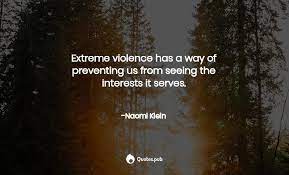
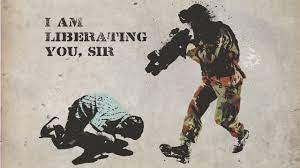 Many writers have pointed to the havoc and ruin that have accompanied the imposition of free markets across the world. Whether in Africa, Asia, Latin America or post-communist Europe, policies of wholesale privatisation and structural adjustment have led to declining economic activity and social dislocation on a massive scale. Anyone who has watched a country lurch from one crisis to another as the bureaucrats of the IMF impose cut after cut in pursuit of the holy grail of stabilisation will recognise the process Naomi Klein describes in her latest and most important book to date. Visiting Argentina not long before the economic collapse of 2002, I found the government struggling to implement an IMF diktat to roll back public spending at a time when the economy was already rapidly contracting. The result was predictable, and the country was plunged into a depression, with calamitous consequences in terms of poverty and social breakdown.
Many writers have pointed to the havoc and ruin that have accompanied the imposition of free markets across the world. Whether in Africa, Asia, Latin America or post-communist Europe, policies of wholesale privatisation and structural adjustment have led to declining economic activity and social dislocation on a massive scale. Anyone who has watched a country lurch from one crisis to another as the bureaucrats of the IMF impose cut after cut in pursuit of the holy grail of stabilisation will recognise the process Naomi Klein describes in her latest and most important book to date. Visiting Argentina not long before the economic collapse of 2002, I found the government struggling to implement an IMF diktat to roll back public spending at a time when the economy was already rapidly contracting. The result was predictable, and the country was plunged into a depression, with calamitous consequences in terms of poverty and social breakdown.
Klein believes that neo-liberalism belongs among “the closed, fundamentalist doctrines that cannot co-exist with other belief-systems … The world as it is must be erased to make way for their purist invention. Rooted in biblical fantasies of great floods and great fires, it is a logic that leads ineluctably towards violence.” As Klein sees it, the social breakdowns that have accompanied neo-liberal economic policies are not the result of incompetence or mismanagement. They are integral to the free-market project, which can only advance against a background of disasters. At times, writing in a populist vein that echoes her first book No Logo, published seven years ago, Klein seems to suggest that these disasters are manufactured as part of a deliberate policy framed by corporations with hidden influence in government. Her more considered view, which is also more plausible, is that disaster is part of the normal functioning of the type of capitalism we have today: “An economic system that requires constant growth, while bucking almost all serious attempts at environmental regulation, generates a steady stream of disasters all on its own, whether military, ecological or financial. The appetite for easy, short-term profits offered by purely speculative investment has turned the stock, currency and real estate markets into crisis-creation machines, as the Asian financial crisis, the Mexican peso crisis and the dotcom collapse all demonstrate.”
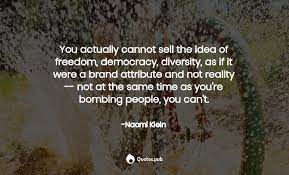
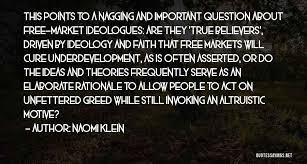 There are very few books that really help us understand the present. The Shock Doctrine is one of those books. Ranging across the world, Klein exposes the strikingly similar policies that enabled the imposition of free markets in countries as different as Pinochet’s Chile, Yeltsin’s Russia, China and post-Saddam Iraq. Part of the power of this book comes from the parallels she observes in seemingly unrelated developments. In a fascinating and alarming examination of the underside of recent history, she notes the affinities between the policies of shock therapy imposed in the course of neo-liberal market reform and the techniques of torture that have been routinely used by the US in the course of the “war on terror”. Klein begins her first chapter with a moving account of a conversation she had with a victim of a covert programme of mind-control experiments, carried out in Canada in the 1950s, which used people suffering from minor psychiatric ailments to try out techniques of “de-patterning” that aimed to scramble and reshape their personalities.
There are very few books that really help us understand the present. The Shock Doctrine is one of those books. Ranging across the world, Klein exposes the strikingly similar policies that enabled the imposition of free markets in countries as different as Pinochet’s Chile, Yeltsin’s Russia, China and post-Saddam Iraq. Part of the power of this book comes from the parallels she observes in seemingly unrelated developments. In a fascinating and alarming examination of the underside of recent history, she notes the affinities between the policies of shock therapy imposed in the course of neo-liberal market reform and the techniques of torture that have been routinely used by the US in the course of the “war on terror”. Klein begins her first chapter with a moving account of a conversation she had with a victim of a covert programme of mind-control experiments, carried out in Canada in the 1950s, which used people suffering from minor psychiatric ailments to try out techniques of “de-patterning” that aimed to scramble and reshape their personalities.
Employing electroshock therapy, sensory deprivation and drug-induced comas, these experiments helped develop some of the “coercive interrogation techniques” that have been practised in Guantánamo Bay. Klein uses torture as a metaphor, and does not claim any cause-and-effect link between its re-emergence and the rise of neo-liberal shock therapy; but she does point to some disquieting similarities. Individuals and societies have been “de-patterned” with the aim of remaking them on a better, more rational model. In each case, the experiments have failed, while inflicting lasting and often irreparable damage on those who were subjected to them.
But has the free market experiment failed? As Klein sees it, free market shock therapy may actually have succeeded in achieving its true objectives. Post-invasion Iraq may be “a ghoulish dystopia where going to a simple business meeting could get you lynched, burned alive or beheaded”. Even so, Klein points out, Halliburton is making handsome profits – it has built the green zone as a corporate city-state, and taken on many of the traditional functions of the armed forces in Iraq. An entire society has been destroyed, but the corporations that operate in the ruins are doing rather well. Klein’s message, then, seems to be that – at least in its own, profit-centred terms – disaster capitalism works.
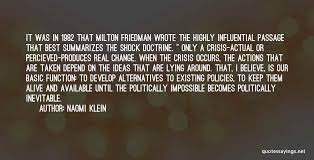
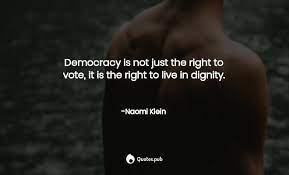 There can be no doubt that fortunes have been reaped from the Iraq war as they have been from other experiments in disaster capitalism. Yet I remain unconvinced that the corporations Klein berates throughout the book understand, let alone control, the anarchic global capitalism that has been allowed to develop over the past couple of decades – any more than the neo-liberal ideologues who helped create it foresaw where it would lead. Rightly, Klein insists that free market ideology must bear responsibility for the crimes committed on its behalf – just as Marxist ideology must be held to account for the crimes of communism. But she says remarkably little about the illusions by which neo-liberal ideologues were themselves blinded. Milton Friedman and his disciples believed a western-style free market would spring up spontaneously in post-communist Russia. They were left gawping when central planning was followed by the criminalised free-for-all of the 90s, and were unprepared for the rise of Putin’s resource-based state capitalism. These ideologues were not the sinister, Dr Strangelove-like figures of the anti-capitalist imagination. They were comically deluded bien-pensants, who promoted their utopian schemes with messianic fervour and have been left stranded by history, as the radiant future they confidently predicted has failed to arrive.
There can be no doubt that fortunes have been reaped from the Iraq war as they have been from other experiments in disaster capitalism. Yet I remain unconvinced that the corporations Klein berates throughout the book understand, let alone control, the anarchic global capitalism that has been allowed to develop over the past couple of decades – any more than the neo-liberal ideologues who helped create it foresaw where it would lead. Rightly, Klein insists that free market ideology must bear responsibility for the crimes committed on its behalf – just as Marxist ideology must be held to account for the crimes of communism. But she says remarkably little about the illusions by which neo-liberal ideologues were themselves blinded. Milton Friedman and his disciples believed a western-style free market would spring up spontaneously in post-communist Russia. They were left gawping when central planning was followed by the criminalised free-for-all of the 90s, and were unprepared for the rise of Putin’s resource-based state capitalism. These ideologues were not the sinister, Dr Strangelove-like figures of the anti-capitalist imagination. They were comically deluded bien-pensants, who promoted their utopian schemes with messianic fervour and have been left stranded by history, as the radiant future they confidently predicted has failed to arrive.
The neo-liberal order is already facing intractable problems. The Iraq war may have allowed another experiment in shock therapy, but a failed state has been created as a result of which Gulf oil – which a former chair of the US joint chiefs of staff accurately described as “the jugular vein of global capitalism” – is less secure than before. Faced with defeat in Iraq, the Bush administration seems to be gearing up for an assault on Iran – a desperate move that would magnify the existing catastrophe many times over. At the same time financial crisis has reached into the American heartland as an implosion in speculation-driven credit markets has started to spread throughout the system. It is impossible to know how these crises will develop, but it is hard to resist the suspicion that disaster capitalism is now creating disasters larger than it can handle.
John Gray’s most recent book is Black Mass: Apocalyptic Religion and The Death of Utopia (Allen Lane)
Bleakonomics
By JOSEPH E. STIGLITZ
There are no accidents in the world as seen by Naomi Klein. The destruction of New Orleans by Hurricane Katrina expelled many poor black residents and allowed most of the city’s public schools to be replaced by privately run charter schools. The torture and killings under Gen. Augusto Pinochet in Chile and during Argentina’s military dictatorship were a way of breaking down resistance to the free market. The instability in Poland and Russia after the collapse of Communism and in Bolivia after the hyperinflation of the 1980s allowed the governments there to foist unpopular economic “shock therapy” on a resistant population. And then there is “Washington’s game plan for Iraq”: “Shock and terrorize the entire country, deliberately ruin its infrastructure, do nothing while its culture and history are ransacked, then make it all O.K. with an unlimited supply of cheap household appliances and imported junk food,” not to mention a strong stock market and private sector.
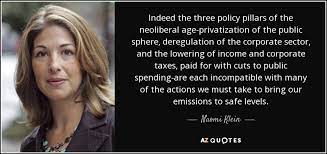
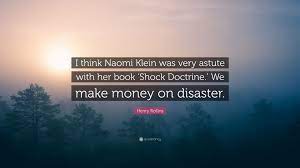 “The Shock Doctrine” is Klein’s ambitious look at the economic history of the last 50 years and the rise of free-market fundamentalism around the world. “Disaster capitalism,” as she calls it, is a violent system that sometimes requires terror to do its job. Like Pol Pot proclaiming that Cambodia under the Khmer Rouge was in Year Zero, extreme capitalism loves a blank slate, often finding its opening after crises or “shocks.” For example, Klein argues, the Asian crisis of 1997 paved the way for the International Monetary Fund to establish programs in the region and for a sell-off of many state-owned enterprises to Western banks and multinationals. The 2004 tsunami enabled the government of Sri Lanka to force the fishermen off beachfront property so it could be sold to hotel developers. The destruction of 9/11 allowed George W. Bush to launch a war aimed at producing a free-market Iraq.
“The Shock Doctrine” is Klein’s ambitious look at the economic history of the last 50 years and the rise of free-market fundamentalism around the world. “Disaster capitalism,” as she calls it, is a violent system that sometimes requires terror to do its job. Like Pol Pot proclaiming that Cambodia under the Khmer Rouge was in Year Zero, extreme capitalism loves a blank slate, often finding its opening after crises or “shocks.” For example, Klein argues, the Asian crisis of 1997 paved the way for the International Monetary Fund to establish programs in the region and for a sell-off of many state-owned enterprises to Western banks and multinationals. The 2004 tsunami enabled the government of Sri Lanka to force the fishermen off beachfront property so it could be sold to hotel developers. The destruction of 9/11 allowed George W. Bush to launch a war aimed at producing a free-market Iraq.
In an early chapter, Klein compares radical capitalist economic policy to shock therapy administered by psychiatrists. She interviews Gail Kastner, a victim of covert C.I.A. experiments in interrogation techniques that were carried out by the scientist Ewen Cameron in the 1950s. His idea was to use electroshock therapy to break down patients. Once “complete depatterning” had been achieved, the patients could be reprogrammed. But after breaking down his “patients,” Cameron was never able to build them back up again. The connection with a rogue C.I.A. scientist is overdramatic and unconvincing, but for Klein the larger lessons are clear: “Countries are shocked — by wars, terror attacks, coups d’état and natural disasters.” Then “they are shocked again — by corporations and politicians who exploit the fear and disorientation of this first shock to push through economic shock therapy.” People who “dare to resist” are shocked for a third time, “by police, soldiers and prison interrogators.”

 In another introductory chapter, Klein offers an account of Milton Friedman — she calls him “the other doctor shock” — and his battle for the hearts and minds of Latin American economists and economies. In the 1950s, as Cameron was conducting his experiments, the Chicago School was developing the ideas that would eclipse the theories of Raul Prebisch, an advocate of what today would be called the third way, and of other economists fashionable in Latin America at the time. She quotes the Chilean economist Orlando Letelier on the “inner harmony” between the terror of the Pinochet regime and its free-market policies. Letelier said that Milton Friedman shared responsibility for the regime’s crimes, rejecting his argument that he was only offering “technical” advice. Letelier was killed in 1976 by a car bomb planted in Washington by Pinochet’s secret police. For Klein, he was another victim of the “Chicago Boys” who wanted to impose free-market capitalism on the region. “In the Southern Cone, where contemporary capitalism was born, the ‘war on terror’ was a war against all obstacles to the new order,” she writes.
In another introductory chapter, Klein offers an account of Milton Friedman — she calls him “the other doctor shock” — and his battle for the hearts and minds of Latin American economists and economies. In the 1950s, as Cameron was conducting his experiments, the Chicago School was developing the ideas that would eclipse the theories of Raul Prebisch, an advocate of what today would be called the third way, and of other economists fashionable in Latin America at the time. She quotes the Chilean economist Orlando Letelier on the “inner harmony” between the terror of the Pinochet regime and its free-market policies. Letelier said that Milton Friedman shared responsibility for the regime’s crimes, rejecting his argument that he was only offering “technical” advice. Letelier was killed in 1976 by a car bomb planted in Washington by Pinochet’s secret police. For Klein, he was another victim of the “Chicago Boys” who wanted to impose free-market capitalism on the region. “In the Southern Cone, where contemporary capitalism was born, the ‘war on terror’ was a war against all obstacles to the new order,” she writes.
One of the world’s most famous antiglobalization activists and the author of the best seller “No Logo: Taking Aim at the Brand Bullies,” Klein provides a rich description of the political machinations required to force unsavory economic policies on resisting countries, and of the human toll. She paints a disturbing portrait of hubris, not only on the part of Friedman but also of those who adopted his doctrines, sometimes to pursue more corporatist objectives. It is striking to be reminded how many of the people involved in the Iraq war were involved earlier in other shameful episodes in United States foreign policy history. She draws a clear line from the torture in Latin America in the 1970s to that at Abu Ghraib and Guantánamo Bay.
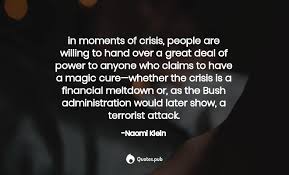
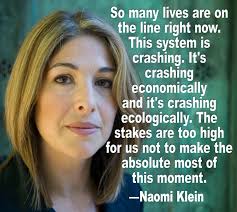 Klein is not an academic and cannot be judged as one. There are many places in her book where she oversimplifies. But Friedman and the other shock therapists were also guilty of oversimplification, basing their belief in the perfection of market economies on models that assumed perfect information, perfect competition, perfect risk markets. Indeed, the case against these policies is even stronger than the one Klein makes. They were never based on solid empirical and theoretical foundations, and even as many of these policies were being pushed, academic economists were explaining the limitations of markets — for instance, whenever information is imperfect, which is to say always.
Klein is not an academic and cannot be judged as one. There are many places in her book where she oversimplifies. But Friedman and the other shock therapists were also guilty of oversimplification, basing their belief in the perfection of market economies on models that assumed perfect information, perfect competition, perfect risk markets. Indeed, the case against these policies is even stronger than the one Klein makes. They were never based on solid empirical and theoretical foundations, and even as many of these policies were being pushed, academic economists were explaining the limitations of markets — for instance, whenever information is imperfect, which is to say always.
Klein isn’t an economist but a journalist, and she travels the world to find out firsthand what really happened on the ground during the privatization of Iraq, the aftermath of the Asian tsunami, the continuing Polish transition to capitalism and the years after the African National Congress took power in South Africa, when it failed to pursue the redistributionist policies enshrined in the Freedom Charter, its statement of core principles. These chapters are the least exciting parts of the book, but they are also the most convincing. In the case of South Africa, she interviews activists and others, only to find there is no one answer. Busy trying to stave off civil war in the early years after the end of apartheid, the A.N.C. didn’t fully understand how important economic policy was. Afraid of scaring off foreign investors, it took the advice of the I.M.F. and the World Bank and instituted a policy of privatization, spending cutbacks, labor flexibility and so on. This didn’t stop two of South Africa’s own major companies, South African Breweries and Anglo-American, from relocating their global headquarters to London. The average growth rate has been a disappointing 5 percent (much lower than in countries in East Asia, which followed a different route); unemployment for the black majority is 48 percent; and the number of people living on less than $1 a day has doubled to four million from two million since 1994, the year the A.N.C. took over.
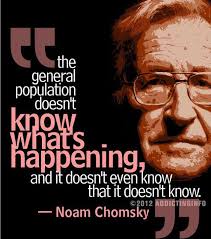
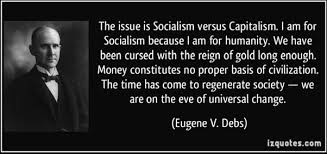 Some readers may see Klein’s findings as evidence of a giant conspiracy, a conclusion she explicitly disavows. It’s not the conspiracies that wreck the world but the series of wrong turns, failed policies, and little and big unfairnesses that add up. Still, those decisions are guided by larger mind-sets. Market fundamentalists never really appreciated the institutions required to make an economy function well, let alone the broader social fabric that civilizations require to prosper and flourish. Klein ends on a hopeful note, describing nongovernmental organizations and activists around the world who are trying to make a difference. After 500 pages of “The Shock Doctrine,” it’s clear they have their work cut out for them.
Some readers may see Klein’s findings as evidence of a giant conspiracy, a conclusion she explicitly disavows. It’s not the conspiracies that wreck the world but the series of wrong turns, failed policies, and little and big unfairnesses that add up. Still, those decisions are guided by larger mind-sets. Market fundamentalists never really appreciated the institutions required to make an economy function well, let alone the broader social fabric that civilizations require to prosper and flourish. Klein ends on a hopeful note, describing nongovernmental organizations and activists around the world who are trying to make a difference. After 500 pages of “The Shock Doctrine,” it’s clear they have their work cut out for them.
Joseph E. Stiglitz, a university professor at Columbia, was awarded the Nobel in economic science in 2001. His latest book is “Making Globalization Work.”
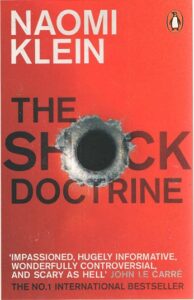
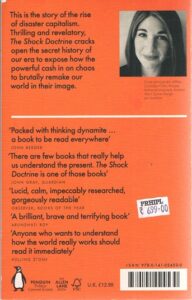
0 thoughts on “The Shock Doctrine: The Rise of Disaster Capitalism”